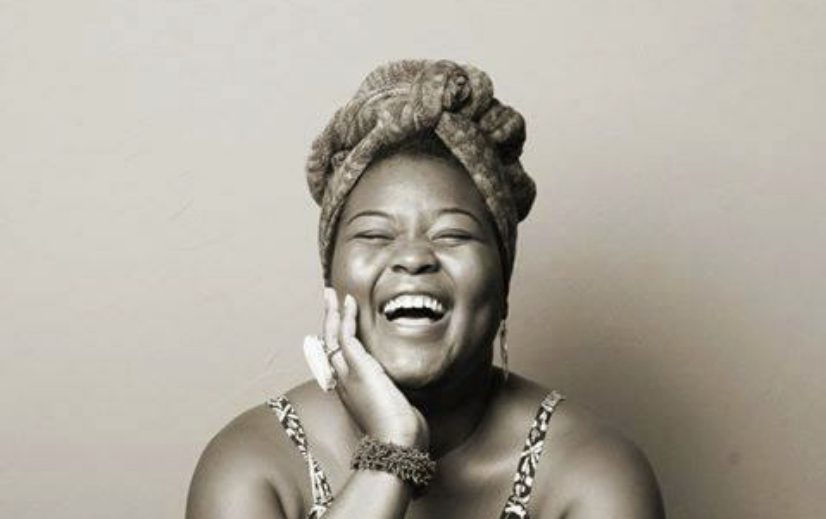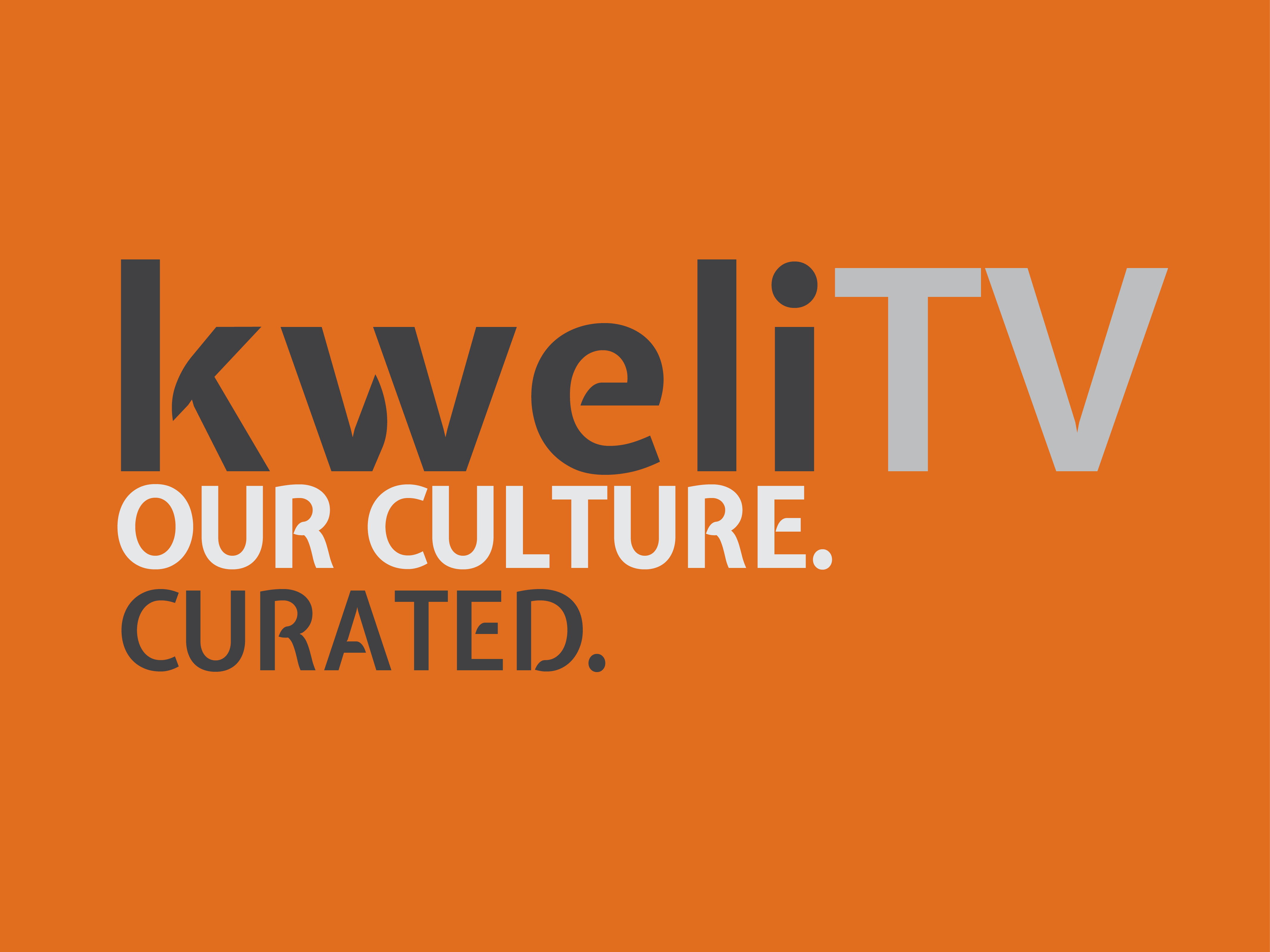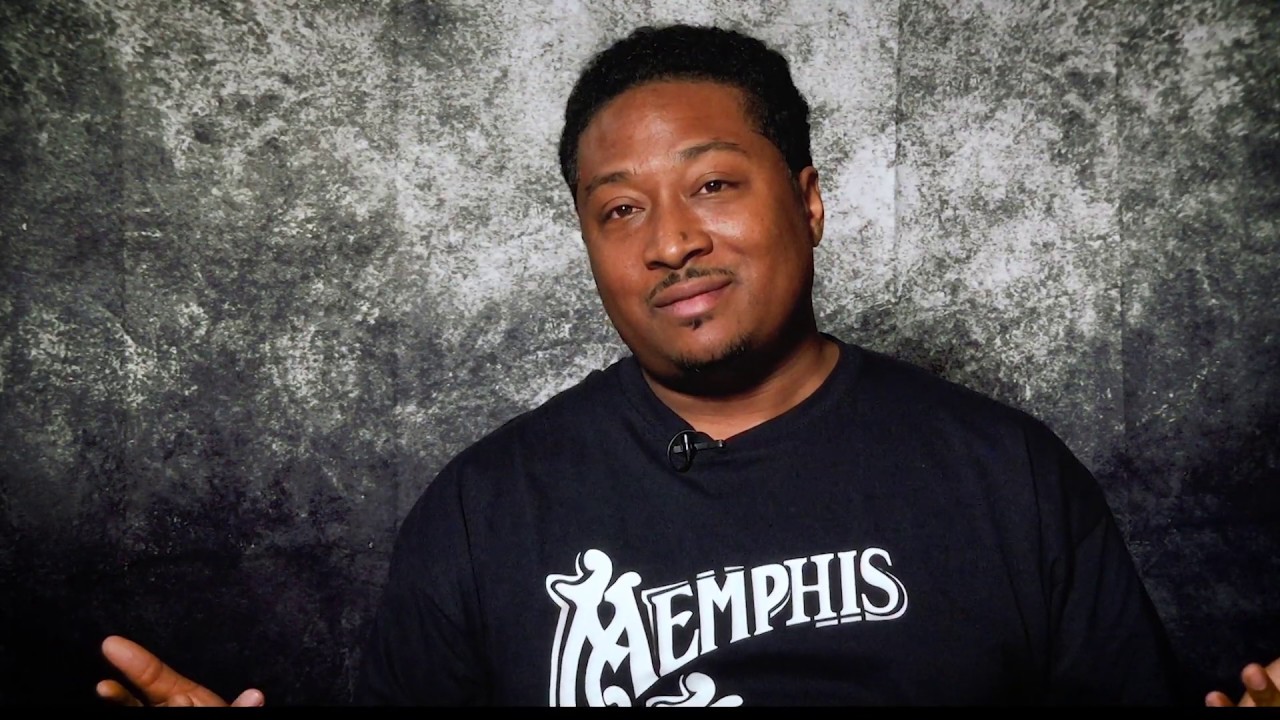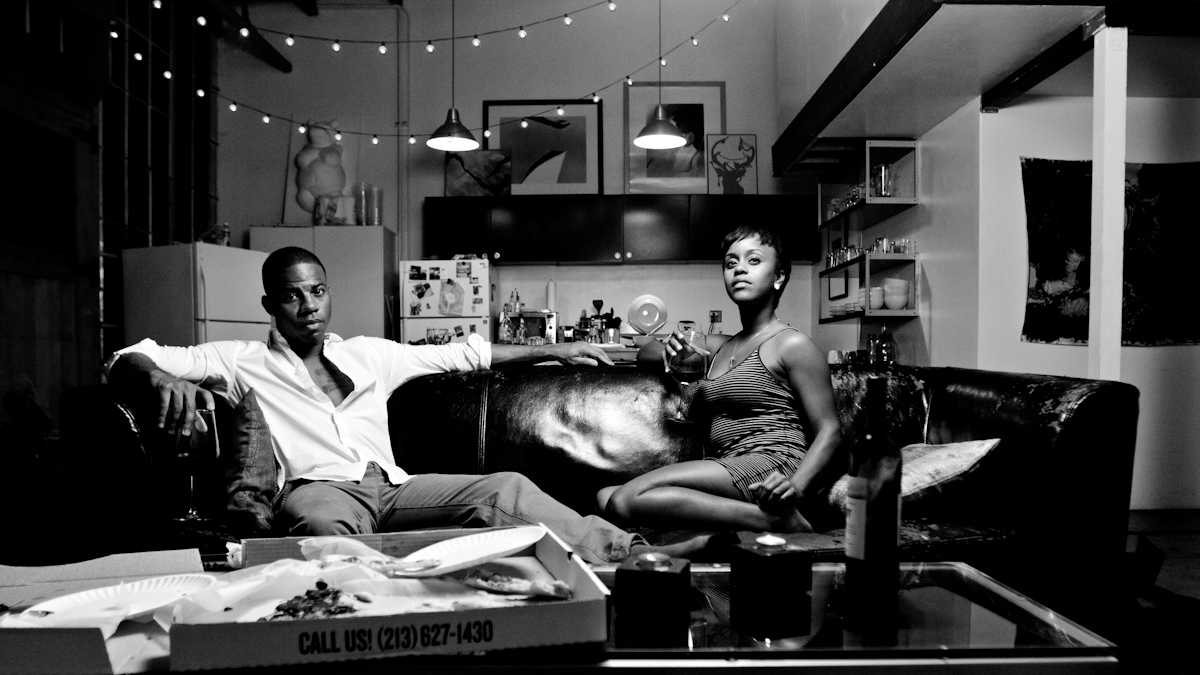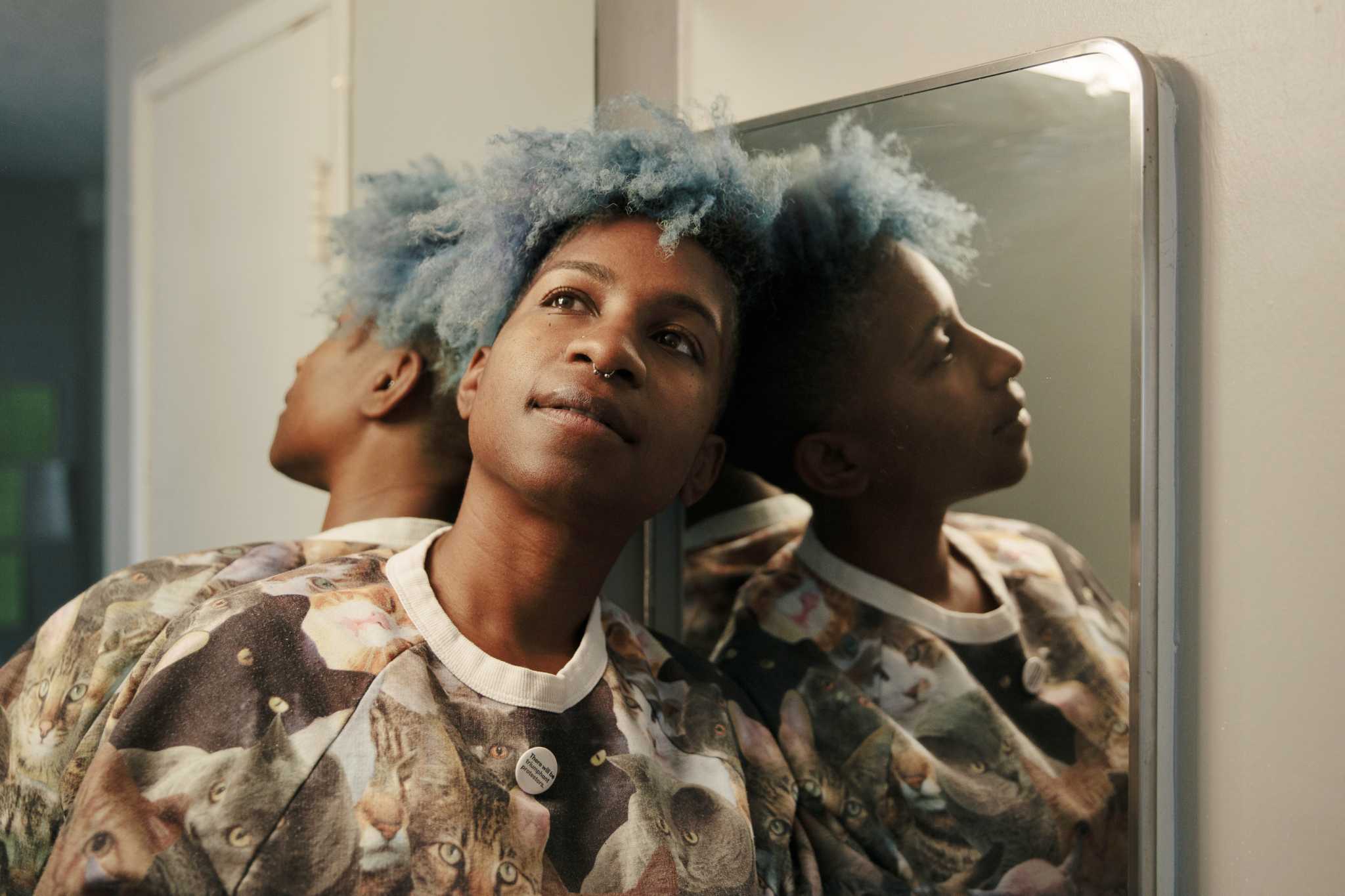Danielle Brockington is a true Jill of all trades whose journey is like no other. She has overcome racism in the workplace during a time when creatives were not as respected as they are today. Growing up and even throughout her career, she has picked up so many great skills, that she continues to use and build upon. Listen in as we dive deeper into her story of how she started out in the world of creativity and ended up where she is today.
Sheila Brown: Hey Danielle, thanks for taking the time out to speak with me. Why don’t you first introduce yourself for those who may not know who you are and what you do.
Danielle Brockington: Hi, I am Dani Brockington. I currently live in Atlanta; I am (laughs)it’s always funny trying to say what I do or what my title is. I am a little bit of a lot of things. I am a production designer, art director, creative director of my brand KNKY Deli, which is an accessories and life style brand and also a creative studio. Which has had to go digital in these Covid times-
Sheila Brown: Right
Danielle Brockington: But mostly that is pretty much what I do. I’m a graphic designer, art director, production designer. (laughs)
Sheila Brown: That’s cool. That’s really-
Danielle Brockington: All around creative and writer. (laughs)
Sheila Brown: Right
Danielle Brockington: Yeah
Sheila Brown: And I know that you call yourself a Jill of all trades, which you definitely are-
Danielle Brockington: (laughs)
Sheila Brown: Given the extensive titles that you have, how did you come to gain all of these different skills and experiences? Were they things you’ve always wanted to try or did the opportunities just come to you?
Danielle Brockington: I think it’s a matter of having a lot of different interests. Growing up, I had a myriad of different interests and they were always nurtured. When I was interested in art, I was sent to art camp. When I wanted to do sculpture, someone bought me clay and a potters’ wheel. When I wanted to do jewelry, someone got me a little jewelry making kit, so I learned that. I just kind of picked up all these skills along the way over the course of my life, and I say that the past several years has been me taking all that data and all that interests nurturing the things that feed me at that time. And getting to a point of alright, this is how all of these things slide together and make sense as a life and a career and not just a hodge-podge of things thrown in. Also, I think it’s a result of being a millennial in this day and age. When I graduated college it was(pause) I graduated into the economic downturn in 2008. So, it was two years I think (pause) yeah two years between my graduating from college and my finding a full-time job. The wild thing about that was my main job, while I was in college, had been working at the apple store. Back then it was a great thing to have all of these different skills, all of these different interests. Because we were the ones who were teaching the classes, we were the ones who were giving people software and tech support when they came into the stores. It was just this free willing creative environment that people could just edit a film on the computer in the stores and we could help them with that and do music production. That was another place I picked up a lot of things, and then having to just hustle. Having to make my own-
Sheila Brown: Right (laughs)
Danielle Brockington: Yeah, so by the time that ended and I graduated, I had to take those skills and I’m doing flyers for people, I’m doing face painting at kid’s birthday parties. It was like all of those things I have pulled from behavior or I was interested in before became the ways I had to make money. By the time I did get a full-time job, it was actually managing a Microsoft campus store because I worked at an apple store. They didn’t really care about my retail management skills or anything like that. My boss who hired me was like “all of that stuff I can train you. I wanted someone who can do visual merchandising. I wanted someone who could be creative and order creative merchandise for the store and bring that edge to it.” So actually with that job, by the time I finished that job, I was doing much less of the day to day store, you know the typical things of running a retail store like ordering you know. My assistant manager I had passed all that off to her and I redesigned the visual branding. We never had- the store- the company had never had a unified visual branding for the company stores. I designed that. I came up with our social media strategy for the internal social system that Microsoft had on their campuses. I was doing marketing (laughs) and visual merchandise.
Sheila Brown: (laughs)You were just doing it all.
Danielle Brockington: Yeah and designing merchandise. I always end up in these situations where someone’s like “I need a thing, I may not know what the name of that thing is, I don’t know how to get to the point. Can you figure out how to make this thing work?” And that’s kind of what I do. I come in and figure out how to make it work.
Sheila Brown: What are some projects that you have worked on that you felt were really important for moving your career in the direction you want it to go?
Danielle Brockington: Well , I think that because I have always had that thing of being dropped into situations. The job that moved me to Atlanta was one of those situations where they didn’t really know what they were looking for at the time. A friend of mine posted on Facebook that, she was like “I’m still looking for a graphic designer for this space we have to fill at my agency and I just cannot find anybody.” And I was like “well you know I’m a designer.” She was looking to fill a full-time position and a part-time position. She was like “it’s a contract, it may only go 4 months or it may go 2 years, I don’t know.” I only put myself forward for the part-time position. I sent her my portfolio, I sent her my resume and I thought (pause)I didn’t think I was good enough to get this full-time position at a major agency at the time. But she interviewed me for the full-time position and they asked me my skill set and I aced that interview. I remember my question at the interview is my question at the end of all interviews. Usually my final question is “Why should I work for you?”
Sheila Brown: Oh Okay
Danielle Brockington: “If I have all these skills, what are you bringing to the table that I should devote my energy in this direction?” When they told me the pay rate, I was like “oh well that’s the reason.” (laughs)
Sheila Brown: (laughs)
Danielle Brockington: I was like bet. So, they hired me for that job and when I got there on the first day and they told me what the actual job description was, they were like “Yeah we didn’t know what else to call this except graphic designer, but what we actually need you to do is” (laughs) “Write scripts, do social graphics, edit videos and shoot videos.” And it was all these things. It was a title that did not exist at the time of a content producer.
Sheila Brown: Right Right
Danielle Brockington: Ok, well all of those are things that I know how to do. Those are all skills I’ve picked up along the way, so I went into it head first. I remember that first day they had already scheduled shooting a commercial with an actor that we had hired that Friday. They didn’t have a script or any guidelines for the commercial, so they asked me to write the script that night, because we had a meeting at 8:30 the next morning to go through the script. So, I go home and I’m like fine, I wrote the script (laughs). I came in the next morning, I had the script, I had it timed out to the right length of time, I had storyboards, illustrated storyboards, I had the visual effects plugged in where they needed to be. Unbeknownst to me, everyone else thought they were coming into the meeting to hash out the script and write it, but my friend was like “yo write this,” because she knew I would show up the way I showed up and I did. Everyone else was like “ok this is what we’re dealing with.” Being a black-woman who- I mean I was fairly young, I was 29 at the time, but even now I’m 35 and I still appear very young. I’m easily mistaken for being in my mid 20’s. My voice is very light and high pitched, so I come off a lot younger than I am and I have a kind of bubbly personality, so people think I’m a lot younger than I am. I think that coming into certain situations, and that was definitely one of them, in a very high performing way intimidates people a lot of the time. That was the job I learned the tricks of the trade of corporate America, and being a creative you are not removed from those issues. A lot of people think that being a creative you are kind of removed from those corporate pitfalls because you’re more free spirited and you have more flexibility, but that’s not the case (laughs)
Sheila Brown: Right, no I definitely understand. (laughs)
Danielle Brockington: Those pitfalls are still very much still there and that position ended up lasting- it wasn’t quite 2 years. I want to say it was 20 months, we almost got to 2 years on that project. But, I learned so much- I learned a lifetime on that contract. I worked really hard. I made work that I was really really proud of. It actually put me into a position where by the time that it ended, there wasn’t really a job that was that thing I was doing yet and it was odd because I was getting paid gobs of money to do this really fun stuff, this really fun creative stuff and skills, and now I’m being told when I’m going in for other positions, when I’m interviewing for other things, I’m being told that it’s ridiculous for you to expect to make that much money at an agency. I remember being hired at an agency where I was expected to only write and not do any creative content. They interviewed me and wanted my portfolio and wanted me for all those things ostensibly. When I actually got into the position, I was only writing press releases and social copy and they were hiring, outsourcing, all of their design work to someone else, which was funny because at the agency I moved to Atlanta for, the content producer position, I was very limited to only doing creative. I could only do graphics. I could only do videos. I could only write scripts up to a point, until a much later point in the job where they finally started letting me script. I was very limited in anything writing oriented, even in situations where the copy had to go along with the visual.
Sheila Brown: Yeah it would make more sense for you-
Daniel Brockington: Even though my skillset is very much in both, I think of them very linked to one another. It was just very siloed. I remember doing an experiment with the- in that position, I’ll go back a little bit, in that position specifically, the creatives, the designers were contractors, never flipped over to fulltime employees. At that time, that particular agency had no creative director and had no creative team. They outsourced all their visuals to contractors who weren’t even onsite. So I was brought in as a contract designer, but myself and my colleague, we had corner offices. We were the only creatives that were there onsite, we were working for a particular project that was a quite lucrative project for the agency. I remember a day that the office manager was giving a new employee a tour of the office and they came around to our side of the office and the new employee made the comment “Oh this must be where the creatives are”. She saw our giant macs and our dual screens and everything and the office manager said, “oh we don’t have any creatives.” She looked me dead in my eye… (laughs)
Sheila Brown: Dang
Danielle Brockington: …through the glass in my office and said “Oh we don’t have any creatives.” We were treated very much like the hired help and it was obvious that there was a resentment that this creative work was being done by two black people. Who were very highly paid for what we did, who had, who should have had autonomy in setting our hours and setting how we flowed through the office. Because we were offsite a lot of the time, we traveled back and forth often and the resentment of that was kind of palpable. I remember doing an experiment with one of my supervisors, where the person whose task it was to write the social copy for the graphs I created, she was a 26-year old white girl. She often complained that she could not write the copy that matched our stuff, cause it was really witty. We were working for a company that- we were working for an entertainment company I’ll say that much. We were doing really timely content along with TV shows and this was when “Empire” had just come out. It was, It was-
Sheila Brown: It was going with what was going on at the time.
Danielle Brockington: Yeah it was supposed to be Fresh. Keep in mind that this was before you had Twitter accounts like Wendy’s and Twitter accounts- this was before you had this whole thing of sassy, I’ll put “sassy” in air quotes. Everything was expected to be even and straight lace and appealing to everyone. This was before black twitter was a marketable thing that brands were jumping onto. I would write copy and she would turn in the copy that I wrote, along with the graphics and the first time she did that she told our supervisor, who approved our creative, who was a white man himself; she told him that I’d written some of the copy. He called me into his office later and chastised me for writing copy, because that was a misuse of my time. My time was to be dedicated to doing creative only. I was not hired to do that and I was basically overstepping my bounds by writing tweets in his words. I told her that the next time you know she asked me for some help on some copy. I was like “girl I can’t help you because I was told that I can’t help you.” So we did an experiment where I wrote her entire calendar of copy. I wrote all of the copy for that week’s calendar. She turned it in and did not tell him that I wrote the copy, she just took credit for it. He approved all of it, he loved it, he praised her for it and that’s what was posted. That’s where I was like “ok I see (laughs) I see how this works (laughs).”
Sheila Brown: Especially with a skill like that, if you can do it all companies will be jumping for that. They love hiring one person who can just do everything.
Danielle Brockington: Well now I realize that, but then and this wasn’t that along. This was like 5 years ago.
Sheila Brown: You said “Empire” came out and you know “Empire” didn’t come out crazy long ago.
Danielle Brockington: Yeah this was not that long ago. This was like 2014/2015.
Sheila Brown: Right
Danielle Brockington: Even by the time I ended that contract, when I was getting hired, even when I was trying to get hired at other places, I kept getting this static. That sometimes would be “you’re overqualified”, sometimes it would be “we only need this skillset.” The overqualified was coming up a lot. I had a couple of conversations with professionals in the field, with marketing professionals in the field, that were working for other companies that were in bigger cities. This is me thinking like “I’m in Atlanta, this should be, I’m moving from Charlotte, this is Atlanta, all of these business’s headquarters are here.” I love Atlanta as a city so, I wasn’t ready to move yet. I was told “do not stop doing what you’re doing.” Because what it is ,the skillset that you have and what you’re doing, businesses don’t realize that they need this yet. They are still going on old models, this is a new model of doing it, to have this one person or one team of people even, who can just do it all in house. People were still stuck on this very siloed way of being. That and the agency experience that I had after that I decided that I just didn’t want to work for agencies anymore. I wanted to do what I do independently and that’s when I started committing myself to working for small black owned businesses. Providing that kind of know-how, production experience, and working with their content and portioning it for social media and that kind of digital experience. Bringing that experience to small businesses. What I didn’t realize, what I quickly realized was that the thing is small businesses don’t have the budget. (laughs)
Sheila Brown: Right that’s the only thing.
Danielle Brockington: That’s the only thing (laughs)but that’s also when I started taking my own creative pursuits and working those into more of a business model for myself, that could sustain me so that I could have this other work that I was doing on the side, that wasn’t paying as much that was still very hands on and hi-touch business. But I could still sustain myself on it and I kind of, I never quite hit the balance that I wanted to hit with that. I’m still in the process of that balance, but I did hit a good balance with it. I did a project that I really loved for a friend of mine who has a hair care brand. She is based in Atlanta, “The Good Hair Shop,” so I did a series of digital events for her. We did live videos and some talk back sessions around different topics with black hair. I produced her grand opening, her grand re-opening. She recalibrated her salon into selling products only. I did everything from managing the social leading up to it, managing the live social during the event, hosting the product give away and raffles she did during the event and I also did her store window. I designed her store window, so that lead into smaller other projects and that kind of built this reputation of “Oh when I’m having an event, Dani could do my window, Dani could help me dress this space, Dani could do the social media at this event.” It was one of those things that leapfrogged me into this other realm of activities and gave me the time. One of the nice things about that contract position was that I was making so much money. that I was able to save a lot of money that I was able to live off that for a little to keep me afloat.(laughs) I was living in West end at the time. I had this gorgeous house, gorgeous front porch and I started opening up my home as an event space basically. I had a few people use it to shoot videos or shoot their own content at the house. Because I had everything set up, I was doing content shoots for my job at the house anyways-
Sheila Brown: So it was already set up that way.
Danielle Brockington: Yeah, so it was already set up. At one point my mom came and helped me convert my front living room into a standing retail area. So, I would have shopping hours every weekend, where people could come in and shop because I have a side project with my aunt. She is an amazing fashion designer. I collect wax prints, African wax print fabrics and she just turns them into amazing things, amazing clothing. I take the scraps and make accessories. That’s where KNKY Deli came from or what it had evolved to, so I had retail set up in the front of the house. That’s when both those brands started to really blossom because I had the time and space to nurture them.

Danielle Brockington: Between the retail, brunches, and the major thing, some friends of friends- They weren’t my friends at the time, I didn’t really know them well at the time. I just knew “House of June,” a collective of filmmakers or well it’s a duo of black women filmmakers in Atlanta, Ebony and Amber. They were looking for a location to shoot a short film and I offered up my home. They came, they toured and they said, “oh we can shoot the whole thing here” (laughs).We made those arrangements and they had a production designer they were working with. Her name was Alahna, she was really great and she spent a lot of time at my house converting my house into the spaces that they needed. She used some panels from Lowe’s and repainted- she didn’t paint it, she used the panels to make my guest bedroom look like it was this bubble gum pink and white wonderland. They ended up not even needing to buy a whole bunch of things because my house was a prop house of its own. It was just the vibe they already wanted for the thing. Working with her was really fun and building/creating these worlds inside my own home was kind of the same skillset I used when designing store windows or even interior designing my own spaces for my own events. It was like a cool translation of those things. Some of my accessories that I was making at the time ended up being in the film. I made a headpiece- cause Alahna was trying to figure out- “I want to make this headpiece, but I’m not sure how to make it” and I make these elaborate flower crowns. I was like “oh you need to make a crown? Bet I got you” (laughs). So I made that and the film ended up premiering on “Revolt” a couple of months ago. It’s called “Telephone,” it was really great.

A couple of months, after that happened, a tree fell through my house and bashed up everything I own, bashed up the house. Because I was renting, I couldn’t stay in the house. The homeowner remodeled it and now she lives in it. I was kind of left baffled. I don’t know what to do with my life anymore (laughs) because my whole life was this eco system I was building with this house as the bases for it. It was the space for everything; I was having craft classes in this house. I was doing all these things so I ended up leaving Atlanta after that happened. I moved back to Charlotte with my mom for a while and I kind of wasn’t doing anything because I was trying to get my mind back right, trying to get my- just whole situation back together. Sometime a few months later, it was within 6 months, I came across a Facebook post about “The Guild” and it was an apartment building in Atlanta. Originally “The Guild” was co-living community- that’s what it still is, a co-living community that my now friend Nikishka had built in her home. She had a cohort of people, of activists, entrepreneurs, social entrepreneurs, artists, who were living in her house together and there was programming involved. Kind of giving everyone the support they needed to build whatever it was they were building and create whatever it was they were creating. She decided to work with a developer and build an actual physical apartment community on Auburn Avenue, in the Sweet Auburn district. I saw an announcement about these micro-apartments, this co-living community in Atlanta, if you wanted to tour it, take a look at it, check it out and it just so happened I was gonna be in Atlanta that weekend with my mom, I was gonna take her to the Anita Baker concert. We just went by and looked at it, while I happened to be there that weekend, and I really liked it. I really liked the actual apartments, I liked the idea of it, I liked Nakishka, I liked that area. So I moved in there, was living there and that just kind of has become the thing that I’d lost, and rebuilding the life that I had, but rebuilding it in a different way. “The Guild” is seven apartment units, two of them are short-term rental Airbnb units. When they are not being rented as Airbnb’s, we use them. I’ve used the empty apartments to do photoshoots or to have pop-ups for my clothes and accessories, for Wanda’s clothes- my aunt’s clothes, and my accessories or to have craft classes. So it’s the space that I used to have, but just remade in a slightly different way. I ended up taking on a job at “The Guild,” as community manager. I do our graphic design for our pamphlets or any materials we may have, our social media, I dabble in- I think I’m gonna outsource it to someone who’s more of a pro at it than I am, but our PR type stuff. I’m doing that stuff. What it’s ended up doing is kind of giving me a platform and giving me the group of people I can test out ideas with. Right now I’m working on a project to kind of go along- we have a small business accelerator program that we did the first round of last year, that we’re about to enter into a second round of for this year. I’ve been working on- I did a session for the small businesses last year and introduced this idea of community collective funded content production. So, if you have a hair salon and you have a food truck and you have an event venue and all of you need content for yourselves. Instead of all of you separately hiring a photographer, hiring a video person, hiring whoever to do photoshoots for you, the three of you can put your resources together and hire one person or one team of people who can do all those things and make them work in a way where they are working for all three of you. So rather than all three of you spending, let’s just say $1500 separately to do those things, you’re cutting that and splitting that up into thirds. My idea also is stretching that a little bit further, because there are so many filmmakers, there are so many creatives who don’t have the funding to get their projects produced. Because producing a film- even producing a short is expensive. Because somebody has to rent that camera or had to buy that camera.
Sheila Brown: Yeah and everything costs money.
Danielle Brockington: Yeah everything costs money yeah. So why can’t those businesses fund the creation of a piece by a filmmaker- an independent filmmaker? Those two things can work together because then you can- I mean big budget films do it all the time, you have product placements and you have these subtle- why can’t I take that thing that’s obviously happening on a macro level and obviously happening on a big budget level? Drill it down; modify it in a way that works for smaller businesses, smaller scale creatives on smaller budgets? All of these things have pushed me forward, pushed me a little bit further forward to figuring out what’s that crystalized thing. Last year- Last summer, Ebony, half of “House of June,” who produced the short film in my home; Ebony was working on a short through her own production company and she asked if I’d be art director. I was like “mmm, I never art directed a film before, but yes” (laughs) I’ll just say yes. I said yes and it was such a dope experience, and I did a good job at it- I did a real good job at it. I was like “ I’m gonna keep doing this,” so I kept doing it for her.
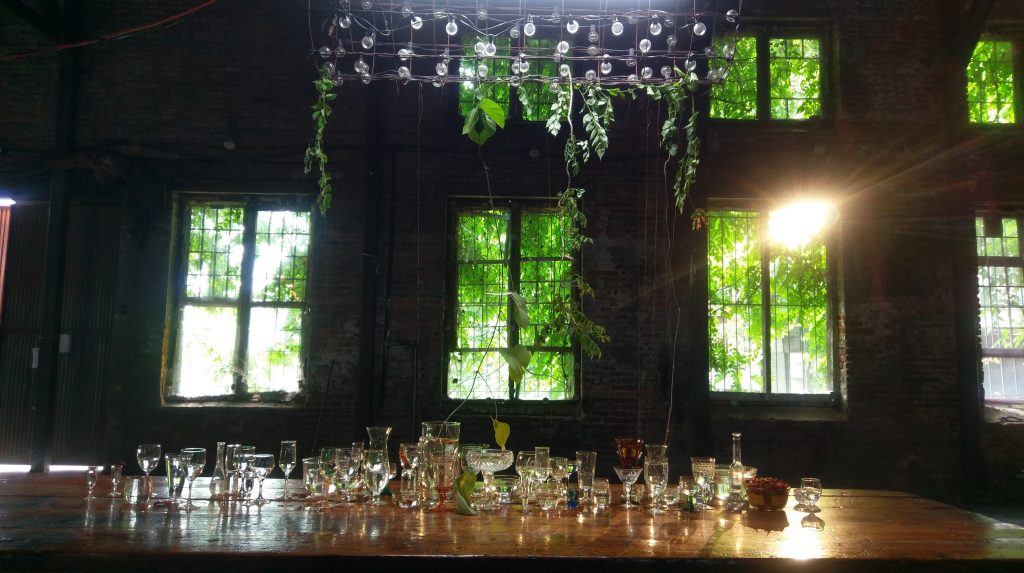
Her partner is a director of music videos, so I art directed a music video for him and I art directed another video that Ebony was directing and I art directed a couple of short films for people who weren’t them; For people who they recommended me for, that’s how that side of things grew. I’m kind of delving deeper into art direction and production design for film and video. Simultaneously, I ended up working on “Raising Dion,” in the costume department for Netflix, because a friend of mine who is a really dope costume designer, her name is Charlese Jones; she hired me to be a PA on set. I’m seeing how all of these things are working together. Again it’s just taking all the bits and pieces and putting it into the context of what I know and what I do and what problems I see need to be solved and alright this is a workable model for community funded creativity that creates a funding ecosystem where everything works together. It’s something that I’m trying out-
Sheila Brown: I’m sure it will go well. It sounds like a great idea you know-
Danielle Brockington: Yeah something I’m trying out-
Sheila Brown: Like you said big companies do it all the time.
Danielle Brockington: Yeah big companies do it all the time. While I was working for “Raising Dion,” we ended up with all these Columbia Jackets, I’m seeing all these brands sending stuff and I’m just like “Wait a minute.” (laughs)
Sheila Brown: (laughs)
Danielle Brockington: I want to pilot the idea with a script I’ve written, that I kind of wrote with brands in mind, that I want to approach and say, “Hey, you need content? I need money to film this thing, shoot this thing, why don’t we do it this way.”
Sheila Brown: Right
Danielle Brockington: I really hope that by the end of this year we’ll see how- it kind of delayed things with everything that’s been going on with COVID.
Sheila: Yeah I know. I understand.
Danielle Brockington: Hopefully by the end of this year, I can get that shot, just see how it works and tweak the model a little bit.
Sheila Brown: It sounds like a great idea and I’m sure that it will do really well. Especially cause a lot of small businesses do need to be put out there and luckily that’s what’s going on right now. That kind of like co-op idea will definitely help a lot of people and filmmakers who are trying to get their work out there.
Danielle Brockington: Definitely
Sheila Brown: I wish you the best of luck with it.
Danielle Brockington: Thank you Thank you Thank you.
Sheila Brown: Thank you for your time and everything, it was great.
Danielle Brockington: No problem no problem and thank you very much for asking.
You can keep up with Danielle by visiting her Instagram @kinkythought and be sure to check out her apparel and future events @knkydeli. Let us support our black creatives as much as we can.
